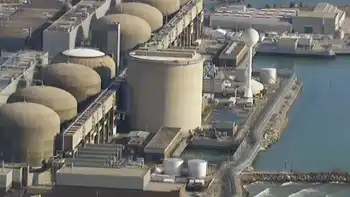Xcel's plans for clean-coal plant may grow
By Rockey Mountain News
NFPA 70e Training - Arc Flash
Our customized live online or in‑person group training can be delivered to your staff at your location.

- Live Online
- 6 hours Instructor-led
- Group Training Available
The utility is considering building a larger plant, about 600 megawatts, instead of the initially proposed 350 megawatts. The power company said the large plant would be more cost-effective for its customers, given the economies of scale.
One megawatt serves the electricity needs of about 1,000 customers.
The clean-coal technology is believed to be one of the most environmentally friendly technologies for producing electricity from coal, since it helps to capture heat-trapping pollutants that lead to global warming.
It is more expensive than traditional plants in which the coal is pulverized and burned to produce heat and electricity - a process that emits carbon dioxide and other harmful gases.
The cost of the initial plant was pegged at $500 million to $1 billion, but any increase in size would boost the cost estimate, too. Xcel's 1.3 million electric customers would have to bear part of the cost of the plant.
Xcel will make a final decision before October, said Frank Prager, managing director of Xcel's environmental policy.
"If it gets to be a bigger project, we will look for ways to defray the cost through partnerships and federal support," Prager said. "But we haven't made a final decision. It's an exciting, but complicated, project."
If approved by state regulators, the plant would be the nation's largest integrated gasification combined cycle project.
"Leadership like (Xcel's) is crucial to address the serious environmental and economic risks of global warming," John Nielsen, energy program director at Western Resource Advocates, has said.
Xcel, which committed $3.5 million last year for preliminary development of the plant, is reviewing two of the finalists from a list of six vendors that applied to design and build the plant. The list included Shell, GE, Conoco Philips, Siemens, Mitsubishi and KBR Gasifier.
A final vendor will be announced by June, Prager said, declining to name the two contenders. He said Xcel also will make a final decision regarding the site of the plant somewhere on Colorado's eastern plains.
Xcel wants to select a vendor and a site by June because that's the deadline to apply for a federal investment tax credit of up to $130 million under the Energy Policy Act of 2005 for the plant.
The project also would qualify for grants under the U.S. Department of Energy's Clean Coal Power Initiative. The agency recently granted $200 million to a clean-coal project in Florida that is under construction. And U.S. Sen. Ken Salazar, D-Colo., helped pass a bill that offers help to such projects at least 4,000 feet above sea level.
The clean-coal technology is used in Florida and Indiana. It has never been tried at a high altitude.
Xcel will file an application with the Public Utilities Commission in October. If approved by regulators, construction could begin as early as 2009. Xcel expects to complete the project around 2013.
Independent power producers criticize Xcel's decision to build the plant itself. They say the risk of cost overruns in the project would be shifted to Xcel's electric ratepayers - although Xcel says building the plant in-house would make sense for its customers.
"The concern with a bigger plant is that it blocks out competition from other generators that Xcel could bring on," said Nick Muller, executive director of the Colorado Independent Energy Association, which represents independent power producers.











